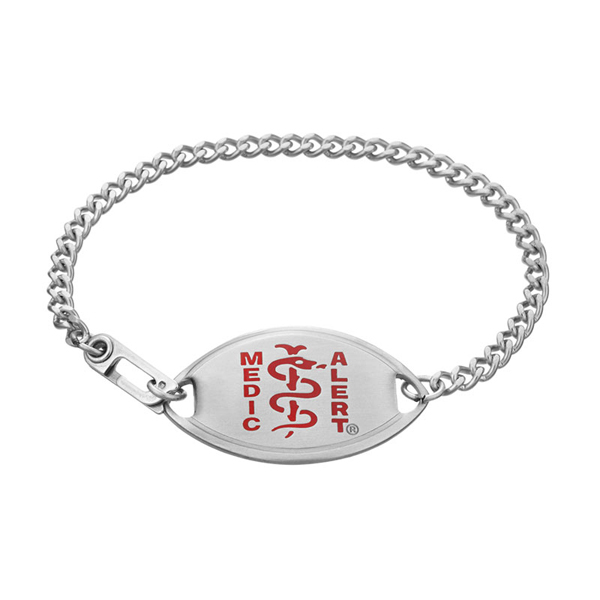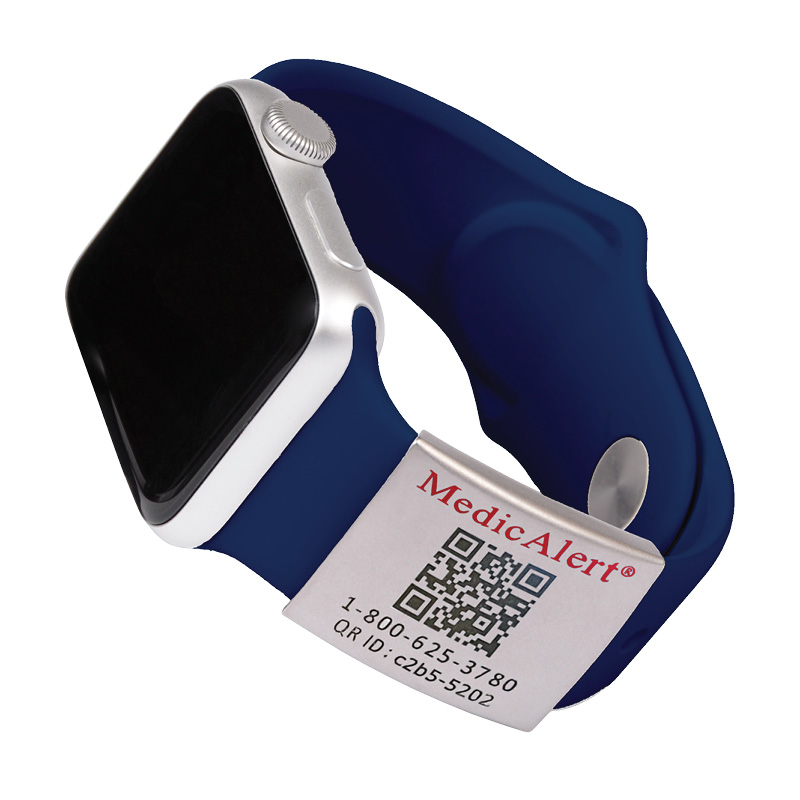The type of medical ID an elderly person chooses will depend on their own personal preference. Our MedicAlert IDs come in all shapes, sizes, and styles, and the front of each ID features our emblem, which is recognized by first responders around the world. Free custom engraving for all MedicAlert medical IDs is designed to protect and keep you safe if you are in an accident or have another medical emergency.
A MedicAlert ID can be a bracelet, necklace, ICE Tag, medical ID for Apple Watch, seat belt holder, shoe tag, Smart IDs, or wallet card.
Alert bracelets for the elderly come in classic, elegant, sporty, or practical styles, as well as a variety of metals, finishes, and emblem colors. Clasps are secure and our elderly alert bracelets provide quick and easy access to your most vital medical information and emergency contact information.
Alert necklaces for the elderly come in popular styles, such as the military dog tag, medallion, and the heart charm. MedicAlert has elderly alert necklaces in 10k and 14k gold, stainless steel, and sterling silver. Our alert necklaces for the elderly are also easy to wear. Simply slip over or off your head without having to deal fastening or adjusting your necklace.
ICE Tags (stickers) use proven QR code technology for quick access to your digital health record – anytime, anywhere. The stickers are highly visible and can be applied to your phone case, helmet, refrigerator door, or mobility aid. A quick scan from a smart phone camera opens up your detailed health profile. In an emergency, first responders can see your medical conditions, medications, allergies, and more.
Medical ID for Apple Watch is a stainless steel attachment that slides onto your existing Apple Watch silicon band. Perfect for active seniors, the Medical ID for Apple Watch is durable and waterproof, with enough space for any medical information that needs to be communicated to first responders in case of an accident or other medical emergency.
Seat Belt Holders are a clever way to capture the attention of first responders, whether you are driving or using a mobility aid such as a walker or wheelchair. With a bright red body and clear instruction: “MEDICAL INFO INSIDE,” a MedicAlert Seat Belt Holder attaches securely to your seat belt or mobility aid with an adjustable Velcro closure so it stays in place. A pocket on the reverse side can hold an ID card or document, enabling first responders to quickly access your vital medical information, emergency contacts, and any special needs you may not be able to communicate during an emergency.
Shoe Tag IDs are made with silicon loops that can be attached to shoes, watch bands, laptops, backpacks, purses, and more. This is a great option for individuals that can’t tolerate metal or those who prefer not to wear jewelry. Shoe tag IDs are also a top option for anyone prone to wandering, including people living with Alzheimer’s disease or dementia.
Smart ID Cards use proven QR code technology for quick access to your personal health information – anytime, anywhere. A quick scan from a smart phone camera opens up your detailed health profile, including medical conditions, allergies, medications, vaccinations, and more. The QR code is always up to date with the latest information in your MedicAlert health profile, ensuring the most accurate care.
Wallet Cards are fillable, folding cards that can store your MedicAlert ID number and current health information. The size of a credit card, a MedicAlert wallet card provides sections for you to write in your personal information, medical conditions, medications, allergies, ICE contacts, and more.




